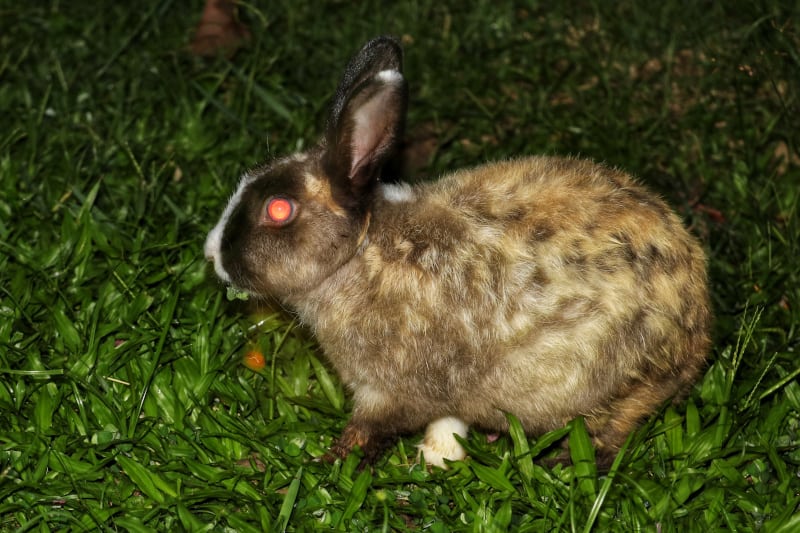If you arrived here you are wondering if rabbits are nocturnal animals. It is impossible to ignore the gentle gaze of a little rabbit. Many people choose to get a pet rabbit just because of how cute they look, but they do not take into consideration their needs and cares. Unfortunately, many of these pets end up being abused and neglected.
For this reason, it is ideal to find out about the sort of pet you will get so you can ensure that it is the right one for you. Let us not forget that our pets are the ones who suffer the consequences of our ignorance. Therefore, before getting a rabbit, we should learn a little about its behavior.
Let’s Get to Know The Rabbits!
Every species adapts to its life cycle. Before being domesticated, rabbits evolved as prey for thousands of years. In the natural way of life, rabbits like numerous different creatures, fill in as the fundamental wellspring of sustenance for predators, for example, wolves, coyotes, falcons, owls, and snakes among others.
Considering the rabbit is a fundamental source of food for numerous species of mammals and predators, it is vulnerable to both terrestrial and aerial depredation, which strongly conditions its daily activity and its need for shelter. In the wild, they adapt their behavior and their life cycles with the sole purpose of surviving.
Are Rabbits Nocturnal?
Although many rabbits show more activity at night, it would be incorrect to say that rabbits are nocturnal. Rabbits are more like crepuscular animals.
What are Crepuscular Animals?
Rabbits, like many other animals, are crepuscular, and their main activity in the wild is foraging for food. In other words, these animals are much more active at dawn and dusk. Their activity decreases during the middle of the day. This behavior becomes more marked from autumn to winter when they are more active in search of food, and a marked decrease in the winter months.
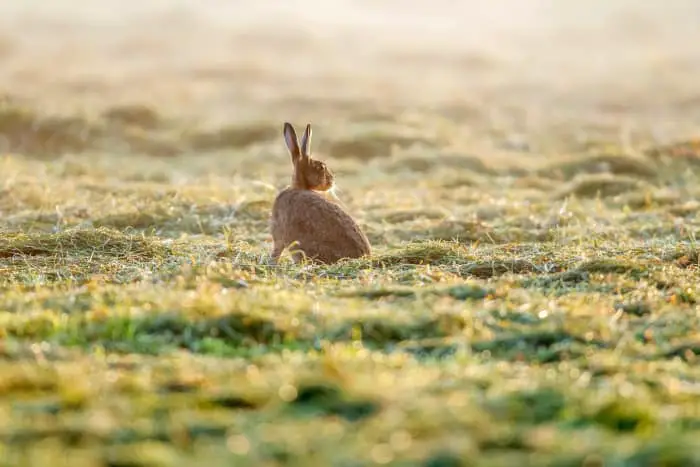

What is The Reason for This Behavior?
The behavior of a crepuscular animal will depend on its biological rhythm. This, in turn, is dictated by the genetics and physiology of the animal, and by the environmental factors. In the end, the only purpose is the survival of the species. That’s how smart and adaptable rabbits are.
Long before they were domesticated, rabbits evolved as a kind of prey for thousands of years. It was safer for rabbits to leave the safety of their burrow and look for food in the transition between day and night when the light is dim.
During the day, rabbits preferably select the areas of scrub, as they offer sufficient coverage to avoid predation by daytime raptors; however, this same scrub can be more dangerous at night due to the presence of nocturnal carnivores. For this reason, during periods of night activity, rabbits select open areas where they are most difficult accessible to terrestrial predators.
What Are the Advantages of These Kind of Behavior?
All animals tend to learn behaviors that help them survive the harsh conditions of their environment.This unique behavior of crepuscular animals gains certain advantages for their lifestyle. Among these we can mention the following:
- Twilight animals are safer when going out at sunrise and sunset times. The chance of being hunted by daytime predators is lower if we assume that the predator has already gained food during the day. Usually, when a twilight animal leaves its shelter, night animals have not yet done so.
- During the time at which these animals become more active, the sun’s rays affect the Earth’s surface in such a way that it is more complicated for both a daytime predator and a night predator to detect its prey. The ideal time to leave their burrows is at dawn and dusk since this is when night predators like owls can’t see well, as a result of an excessive amount of light, while day predators like foxes can’t see well since it is excessively dim for them.
- Animals living in desert conditions, or where the weather is too hot, are protected from the high temperatures of the day and the low temperatures of the night, as they leave their burrows, just as the environmental temperature begins to change.
In nature, only the fittest survive. Without these kinds of behavior, the rabbits wouldn’t be able to survive.
Will My Pet Rabbit Stay Up All Night?
Not necessarily. Rabbits are more active at sunrise and sunset. They are especially awake and dynamic first thing in the morning and late at night. But they can sleep at night too.
Although in the wild, rabbits will be active mainly in the early morning and afternoon, domesticated rabbits may become more adaptable in terms of biological rhythm. These may be slightly affected by artificial lights and can get used to your family’s sounds and feeding times. Rabbits living with artificial lighting are influenced and develop slightly deviated circadian rhythms compared to those living in the wild.
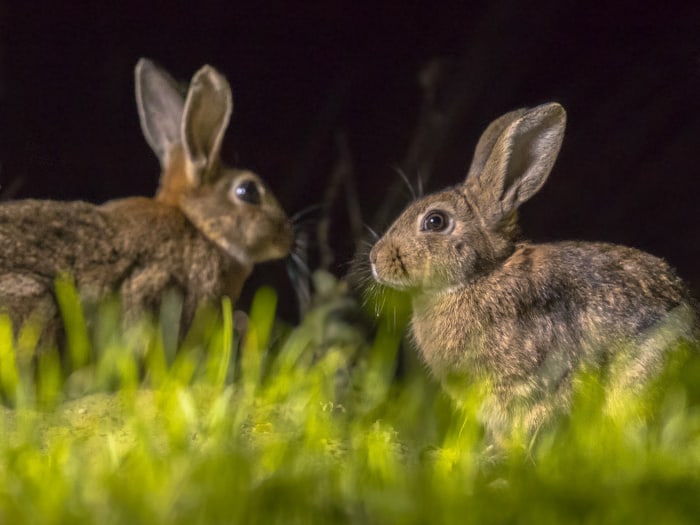

What Kind of Behavior Can I Expect From My Rabbit?
Rabbits usually sleep most of the day. During the day, rabbits are quiet, calm, and sleepy. In the evenings, they become active and turn into playful companions.
So, a rabbit will be more open to your attention early in the morning and evening, a time frame that typically coincides with families who come home from work or finish homework and chores. For this reason, rabbits make the perfect pets for those owners who work or study throughout the day.
Take advantage of these moments to feed and interact with them, and leave them for the rest of the day to rest and replenish their strength. Your pet rabbit will soon get used to its meal and sleep time, and learn when the house gets up in the morning, when you come home from work, and when it’s time to play and share time with you.
What Do Rabbits Do When They’re Awake?
When they are awake, the rabbits spend most of their time grazing. This behavior is extremely important for bunnies to stay healthy. Also, the fact that they are grazing will avoid them becoming bored.
You should take advantage of the hours in which they are most active, to feed them a diet based on hay, green leafy vegetables, and pellets. Leave the leafy vegetables for the morning hours, and the pellets for the afternoon. Many studies have shown that providing evening meals prevents undesirable behaviors, such as chewing and destroying furniture.
When Do Rabbits Sleep?

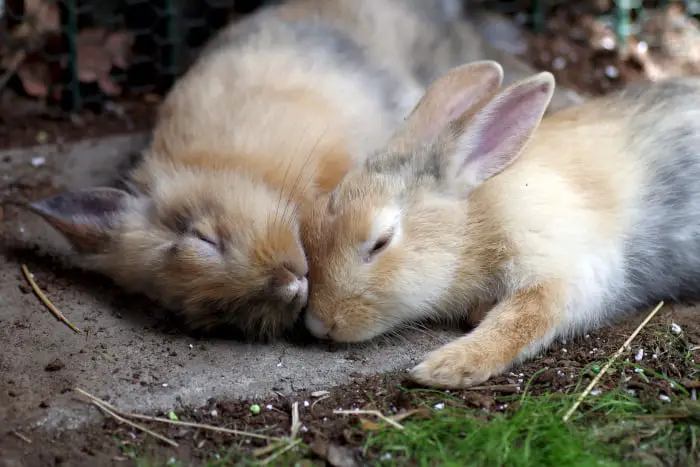
Many people think their rabbits don’t sleep because they always see them with their eyes open. If you’ve never seen your pet rabbit sleep, you don’t need to worry. Like any other living being, rabbits also sleep, even if you don’t see them. They don’t have an exact bedtime like us, who sleep mostly at night, but they distribute their sleep hours throughout the day.
Rabbits can sleep with their eyes open as they like to remain alert to danger. This behavior is more pronounced when the pet rabbit has recently arrived in a new home and have not yet become accustomed to its new environment.
This behavior will remain for the first weeks of coexistence in a new home. For whatever length of time that they don’t feel in an agreeable situation, they can lay down with their eyes open to know about everything that is occurring around them, and to flee away if they feel threatened. As soon as your pet begins to have a sense of security, he will start to unwind, and you will have the chance to watch him sleep calmly.
How Many Hours a Day Does a Rabbit Sleep?
As we have already stated, rabbits are crepuscular animals, which means that their maximum levels of activity are at dawn, and late in the afternoon, when it begins to get dark. These are the best hours to spend time with your pet and to play with it.
During the rest of the day, they can stay much calmer as these are the hours when they sleep the most.
Once the rabbits are sufficiently well acquainted with the house where they reside and with the family with which they live, they may sleep up to 10 hours a day.
How Do I Know If My Rabbit Has Settled Into My Home Yet?
You will know that your rabbit has adapted to its new environment through its body expression. When a rabbit is relaxed, it will often rest on its side or belly with its hind legs stretched out. Your pet rabbit may also sleep with its front, and back legs rolled up under its body.
Sometimes, while they are asleep, you will notice that their bodies are shaky, and their eyelids are trembling as if they were dreaming. Although rabbits remain quiet during their sleep, some others may even snore. However, out of self-protection, their rest will, in general, be light.
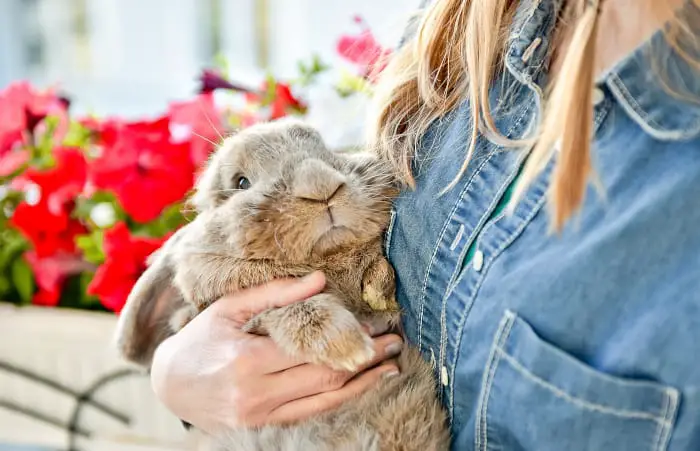

Final Thoughts
Finally, remember that animal behavior is the result of thousands of years of evolution. All animals are driven by instinct. It’s precisely those instincts that have helped them survive through the years. A lot of animals have become domesticated, and have adapted to live with humans. Most of them have become wonderful pets. That is the case with rabbits.
It takes time and patience to bond with a wild animal that has lived in fear and fallen prey to others generation after generation. It’s not easy, but it’s not impossible either.
If your rabbit has developed a strong bond with you, don’t be surprised if it even falls asleep in your lap. Sometimes your furry little friend will seek to snuggle up next to you while you are watching TV or reading a book. You will gain his trust by offering him caresses and lots of love. With time your rabbit will consider you an essential part of his life.

